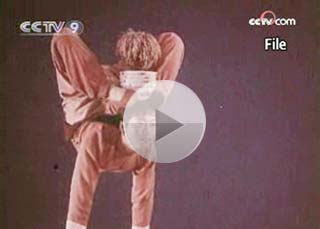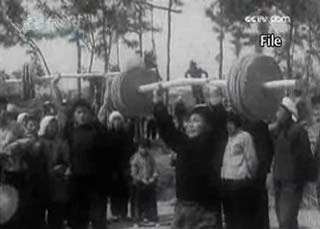------Program code: DO-090112-08704 (what's this?)
Source: CCTV.com
01-12-2009 14:15
 |
One day in June 1972, gunshots could be heard on Baiyangdian Lake, in Baoding, Hebei Province. Battleships from the civil defence force were conducting a military exercise. The show of strength served as revolutionary education for the athletes who were about to take part in the national sports meeting of five ball games.
On June the 9th, 1972, the 20th anniversary of Mao Zedong writing the motto: “Develop Sports and Strengthen the Muscles of the People”, the national sports meeting of five ball games was held simultaneously in six cities, including Beijing, Tianjin, Baoding and Zhangjiakou. This was the first time a national sports meeting had been held in China since 1966. According to a report in People’s Daily, the athletes, referees and everyone else involved in the sports meeting had attended classes beforehand to study Chairman Mao’s motto and other instructions. At the classes, they had denounced the revisionist guidelines that focused on winning medals and perfecting techniques.
 |
In response to Chairman Mao’s call to “Learn from the workers, farmers and soldiers, and perform for the workers, farmers and soldiers,” the participants toured rural, mining and military areas to give sporting exhibitions.
A football match was staged between Hubei and Sichuan.
According to a report in People’s Daily, the Hubei and Sichuan teams, in a demonstration of the true spirit of “Friendship first, competition second”, got together before the match to inform each other of their respective strengths and weaknesses.
With the encouragement of the government, sport once again became a mass activity.
The news bulletin “To Carry Out Mass Sports” showed how two counties; Haian in Jiangsu Province and Futian in Pujiang Province, carried out mass sports activities. Aware that it was wrong to claim that “work and military training can take the place of sports”, they tried to combine their daily work and military training closely with sports and health activities.
People’s Daily, in a review of sports, wrote: “Sports should better serve proletarian politics, the workers, farmers and soldiers, socialist construction, national defence, the friendship between all peoples, and the revolutionary struggle of people around the world!
In June, John King Fairbank, director of the Institute of East Asia Studies at Harvard University, visited China at the invitation of Premier Zhou Enlai.
John King Fairbank had first come to China in 1932 to teach the history of economics at Tsinghua University. He became friendly with architect Liang Sicheng and his wife Lin Huiyin. Liang Sicheng gave him a Chinese name, Fei Zhengqing.
Early in 1972, John King Fairbank had been devastated to hear that Liang Sicheng had died of illness.
In Beijing, John King Fairbank met his old acquaintance from Tsinghua University, Fei Xiaotong. With a smile, Fei Xiaotong showed Fairbank his muscles – developed at the May the 7th Cadre School. Earlier that year, Fei Xiaotong had returned to Beijing from Shayang Cadre School in Hubei Province, and had started work at the Translating Office of the Central University for Nationalities, translating English historical works. Before his meeting with Fairbank, university officials had told Fei Xiaotong not to speak English with him.
